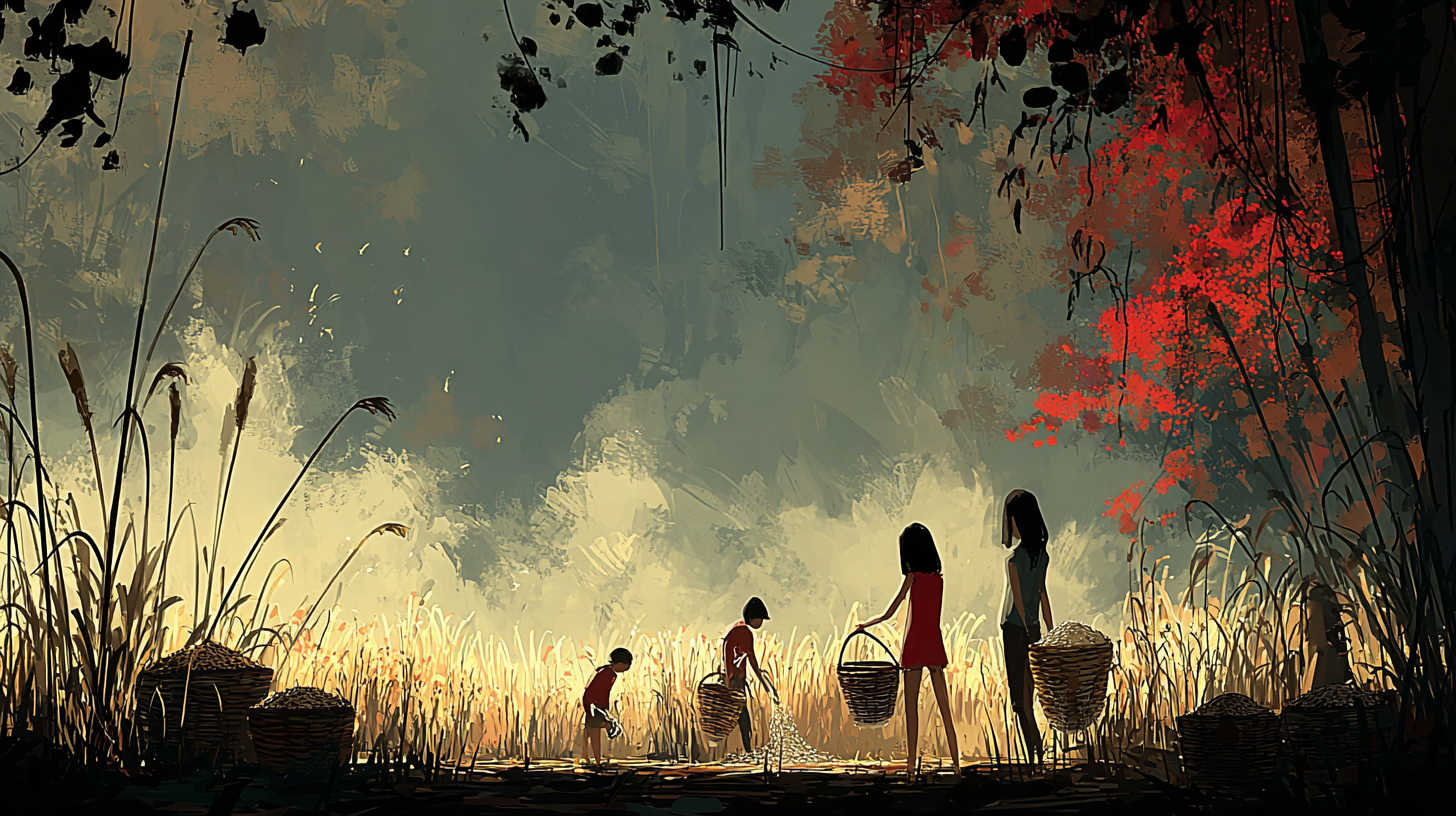To collect crops like rice or wheat from the field.
作物をとったりあつめたりすること。
以下は英単語 “harvest” に関するストーリー型学習コンテンツです。まずは大枠の意味を理解して最後の文章で確認しましょう。
主な意味(main meaning)
| 品詞 | 定義(簡潔) | 発音記号 | 英語例文 |
|---|---|---|---|
| 名詞 | 作物の収穫、収穫期 | /ˈhɑː.vɪst/ | The wheat harvest was very successful this year. |
| 動詞 | 作物を収穫する | /ˈhɑː.vɪst/ | Farmers harvest corn in the autumn. |
語源(etymology)
「harvest」は古英語 hærfest(秋、収穫)に由来し、ラテン語の「carpere(摘み取る)」とも関連しています。
核となるイメージは「自然の恵みを集めること」。
類義語(synonyms)
| 類義語 | 英文例文 |
|---|---|
| gather | The children gathered apples from the tree. |
| reap | Farmers reap the benefits of their hard work in the fall. |
| collect | We collect fresh vegetables from the garden every morning. |
| pick | She picked strawberries all day. |
| crop | They crop vegetables to sell at the market. |
反義語(antonyms)
| 反義語 | 英文例文 |
|---|---|
| plant | They plant rice in the spring. |
| sow | Farmers sow seeds in early March. |
コロケーション(collocations)
| コロケーション | 英文例文 |
|---|---|
| harvest season | The harvest season begins in September. |
| harvest crops | They worked hard to harvest crops before the storm. |
| harvest time | Harvest time is the busiest period for farmers. |
| a good harvest | We had a good harvest thanks to the sunny weather. |
| to harvest rice/wheat | In Japan, people harvest rice in late summer. |
2項表現(binomials)
| 2項表現 | 英文例文 |
|---|---|
| sow and harvest | You must sow and harvest to survive in the countryside. |
| plant and pick | They plant and pick vegetables on the farm. |
英語ストーリー(english story)
Title: “The Big Harvest”
It was early September, and the harvest season had finally arrived. Kenji and his family lived in a small village where most people were farmers. Every year, they planted rice in the spring and waited until autumn to harvest it.
This year, the weather was perfect. There was enough rain, and the sun shone brightly. As a result, they expected a good harvest. Kenji’s father said, “This is the best crop we’ve had in five years.”
Every morning, the family got up early to harvest crops before it got too hot. Kenji helped pick the rice while his mother gathered vegetables from their garden. “I like harvest time,” Kenji said. “It’s hard work, but it’s also fun.”
Their neighbors were also busy. Mr. Tanaka came by and said, “We’ll reap the rewards of our efforts soon.” Kenji asked, “What does ‘reap the rewards’ mean?” Mr. Tanaka smiled and replied, “It means we get something good because we worked hard.”
After ten days of hard work, all the rice was collected. They stored it safely and felt proud. “We plant and pick together, and now we celebrate together,” said Kenji’s mother.
That evening, the village held a harvest festival. People shared food, sang songs, and told stories about past harvests. Kenji realized that harvesting was not just about food—it was about family, community, and being thankful.
和訳
タイトル:「大きな収穫」
9月初め、ついに収穫期(harvest season)がやってきました。ケンジとその家族は、小さな村に住んでいて、ほとんどの人が農家でした。毎年、春にお米を植えて(plant)、秋になるとそれを収穫します(harvest)。
今年の天気は完璧でした。雨も十分に降り、太陽も明るく照りました。そのため、**良い収穫(a good harvest)が期待されました。ケンジのお父さんは「ここ5年で一番いい作物(crop)**だ」と言いました。
毎朝、家族は早起きして、暑くなる前に作業を始めます。ケンジはお米を収穫し(harvest)、お母さんは庭から野菜を集めました(gathered)。「**収穫期(harvest time)**は好きだよ」とケンジ。「大変だけど、楽しいんだ。」
近所の人たちも忙しく働いています。田中さんがやって来て、「もうすぐ努力の**成果を得られる(reap the rewards)**よ」と言いました。ケンジが「それってどういう意味ですか?」と聞くと、田中さんは笑って「一生懸命働いた分だけ、いいことがあるって意味だよ」と答えました。
10日間の努力のあと、すべてのお米が集まりました。家族はそれを安全に保管し、誇りを感じました。「一緒に植えて、収穫し(plant and pick)、一緒に祝うのよ」とお母さんが言いました。
その晩、村では**収穫祭(harvest festival)が開かれました。みんなで食べ物を分け合い、歌を歌い、昔の収穫(harvest)**の話をしました。ケンジは、収穫はただ食べ物を得ることではなく、家族や地域のつながり、そして感謝することだと気づいたのです。
Q&A
- Q「gather」と「harvest」の違いは何ですか?
- A
「gather」は広い意味で「集める」を表し、人や情報、物などさまざまなものに使えます。「harvest」は特に「作物を収穫する」ことに限定されます。
- Q「reap」はどういうときに使いますか?
- A
「reap」は比喩的な表現にも使われ、「努力の成果を得る」という意味で使われることもあります。作物を刈り取る場面でも使われます。
- Q「collect」と「harvest」の違いは何ですか?
- A
「collect」は「集める」の一般的な表現で、作物以外にも使われます。「harvest」は農作物を特定の時期に収穫することを強調します。
- Q「pick」は「harvest」と同じ意味ですか?
- A
似ていますが、「pick」は手で摘む行為を表すことが多く、果物や花などに使います。「harvest」はより広く、機械などを使った収穫にも使われます。
- Q「plant」と「harvest」は反対の意味ですか?
- A
はい。「plant」は「植える」、つまり作物を育て始めること。「harvest」は「収穫する」、育った作物を集める行為です。
- Q「sow」はどんな意味で「harvest」の反対ですか?
- A
「sow」は「種をまく」という意味で、収穫(harvest)の始まりとなる行為を指します。したがって、意味としては対になる関係です。
- Q「harvest season」とは何を指しますか?
- A
「harvest season」は「収穫期」のことで、作物を収穫するのに適した季節、特に秋を指します。
- Q「a good harvest」はどんな時に使いますか?
- A
「a good harvest」は作物の量や質が良かったときに使う表現です。天候や努力の結果が良いときに使われます。
- Q「to harvest crops」はどういう意味ですか?
- A
「to harvest crops」は「作物を収穫する」という意味です。農業の基本的な活動のひとつです。
- Q「plant and pick」はどういう文脈で使われますか?
- A
「plant and pick」は「植えて収穫する」といった農業やガーデニングの流れを表す表現で、セットで使われることが多いです。



コメント